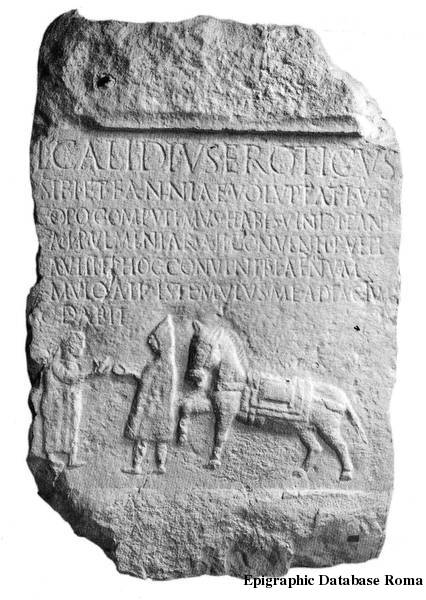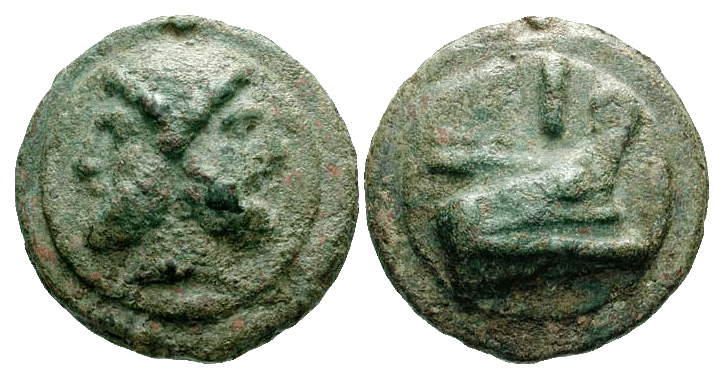Thanks to our partnership agreement with the EAGLE Portal, Ancient History Encyclopedia (AHE) will be republishing select EAGLE stories, on a periodic basis, which illuminate special topics pertaining everyday life and culture in ancient Rome. We hope that you enjoy these ancient vignettes, and we also encourage you to explore EAGLE’s massive epigraphic database.
This story is based on an original story (in Italian) by M. Blasi. A playful inscription from Isernia welcomes you to one of the funniest inns in the whole Roman Empire! Meet the innkeeper, Mr. Erotic (Callidius Eroticus), and his wife Ms. Pleasure (Fannia Voluptas). At the check-out, if you have any question on your itemized bill, don’t forget to ask the landlord!
For most inhabitants of the Roman world, lodging consisted only of a tiny room, not much different from a beehive cell, inside a multistoried and often very precarious building. It is no wonder, then, that the Romans used to live outdoors as much as possible! In the largest cities, squares, public baths, shops and markets were crowded with people from the remotest corners of the whole Empire, clad in strange and colorful clothes, speaking with exotic accents. It goes without saying that in such a dynamic and multicultural society, that had elected diversity as one of its most important resources, places like pothouses (thermopolia) and taverns (popiniae) were extremely popular, both out of necessity and… of pleasure!

Inscription from Aesernia, Italy, 101 AD – 200 AD.
One inscription from Isernia, currently at the Louvre Museum, offers a glimpse on the playful world of a Roman inn, the very special inn managed by Lucius Callidus Eroticus, a former slave, and Fannia Voluptas. Mr. Erotic and Ms. Pleasure, or (as Mary Beard paraphrases the surnames in a blog post dedicated to this text) “Mr. Hot Sex” and “Madame Gorgeous”. No doubt, a marriage made in heaven!
Most likely, judging from the first line, this inscription is part of the funerary monument that Eroticus made for himself and Ms. Pleasure; the extant monument includes also a relief that depicts the funny scene which is so vividly enacted in the text. The monument is reproduced in the image above. The scene (and the joke that it tells) can be appreciated in the translation below:
Calidius Eroticus made [this monument] for himself and Fannia Voluptas while still alive.
– Innkeeper! Let’s work out the bill!
– You’ve had a sextarius of wine, and bread: one as. Relish, two asses.
– Okay.
– The girl, eight asses.
– That’s okay too.
– Hay for the mule, two asses.
– That bloody mule will be the ruin of me.
(Translation of the dialogue by M. Beard)
A customer and the innkeeper are processing the bill at the checkout. Not an uncomfortable stay, judging from the itemized bill! There was apparently no lack of wine, bread and food, and the price of all that was more than fair. Even about the eight asses for the services of a girl the costumer doesn’t seem to have any complaint, quite the contrary.

The as (plural asses), also assarius (rendered into Greek as ἀσσάριον, assarion) was a bronze, and later copper, coin used during the Roman Republic and Roman Empire.
But… what about those two asses for the hay? Two asses, just like for the main course (of the human customer)… Surely, the innkeeper doesn’t want to ruin a poor man by charging this sum; can’t anything be worked out? A small discount on the mule’s expenses maybe? Food, wine, girls and hay for the mule: this gentleman clearly knew his priorities, and who are we to blame him?
After all, if we see the situation from the opposite angle, we cannot but praise Mr. Erotic and Ms. Pleasure for their liberality! Did they serve the same food to both human and animal customers? Was it the regular house policy or just a special treat for this nice mule? For, judging from what we see in the relief, it seems that the beast had enjoyed the stay no less than its master. Is it just me, or is a big smile visible on the face of the mule?
Written by: M. Blasi on Europeana Eagle Portal